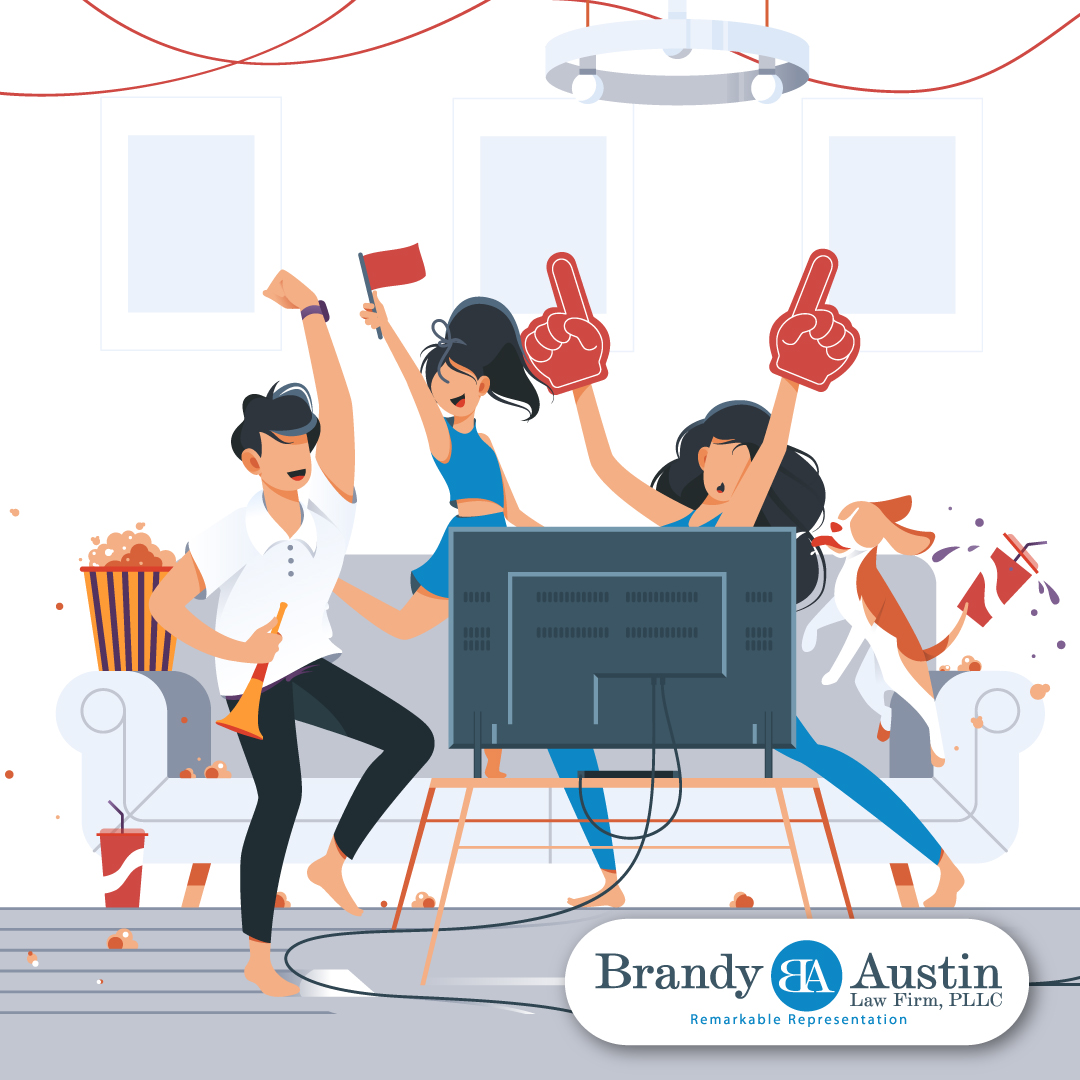Super Bowl LIV Fans Don’t Let Fans Drive Drunk
This Super Bowl season, the U.S. Department of Transportation’s National Highway Traffic Safety Administration is teaming up with Brandy Austin Law Firm to remind football fans and Super Bowl partygoers that designated drivers are the best defense against the dangers of drunk driving. Super Bowl LIV falls on Sunday, February 2, 2020. If your night involves alcohol, plan for a sober ride home. If you’re hosting the party, take care of your designated drivers. Whether you’re the designated driver, heading out for a night at a party or bar, or hosting a Super Bowl party, we want to remind everyone that Fans Don’t Let Fans Drive Drunk.
If you plan to drive: Don’t drink
Be a sober designated driver, help save lives. Remember these tips on game night:
-
- Take your role as designated driver seriously — your friends are relying on you. While at the party, enjoy food and non-alcoholic drinks. Refrain from any alcoholic beverages or drugs.
- Boast about your MVP status on social media using the hashtag #DesignatedDriver. Your positive influence could help keep other sober drivers on the right track.
- Always buckle your seat belt and require your passengers to do the same. Don’t start the car until all passengers’ seat belts are buckled.
Remember: Fans Don’t Let Fans Drive Drunk. If someone you know has been drinking and tries to drive, take their keys and help them get home safely. Even if they make a fuss in the moment, they’ll thank you later.
If you plan to drink: Don’t drive
Before you ever leave the house, make a plan for having a fun, safe night out. Follow these safety tips, and you’ll be on your way to your own Super Bowl win.
-
- You know the rules: It’s illegal to drive drunk. Before you head out to a Super Bowl party, make a game plan that includes a sober driver — someone who will not drink at all, and will safely bring you home.
- Remember that alcohol isn’t the only substance that can keep you from driving safely: Marijuana, like many other drugs, affects a driver’s ability to react to their surroundings. Driving is a complex task, and marijuana can slow reaction time, affecting the driver’s ability to drive safely.
- Make sure your designated driver is actually sober. If he or she decides to drink unexpectedly, call a cab or someone else who you know hasn’t been drinking.
- Encourage your designated driver: Tweet his or her name to @NHTSAgov to add their name to the Wall of Fame.
- Don’t let friends (and fans) drive drunk. Have other partygoers been drinking? Help arrange a safe way for them to get home, too.
- When you ride home with your sober driver, make sure you — and your driver — wear your seat belts. It’s your best defense in a crash.
- Remember, walking impaired can also be dangerous. Designate a sober friend to walk home with you.
- If you find yourself unable to get home safely, tell the host you would like to stay the night.
- Use your community’s sober ride program
If you’re hosting the Super Bowl party
Want to win the night? Be sure all of your guests have a sober ride home.
-
- Ask your guests to designate their sober drivers in advance, or help them coordinate with other partygoers’ designated drivers.
- If you don’t drink, offer to drive guests home or offer to have them stay with you.
- Encourage your drinking guests to pace themselves, eat food, and drink plenty of water.
- Serve a selection of non-alcoholic drinks.
- Make the designated driver feel like a real MVP — tweet the driver’s name to @NHTSAgov, and they’ll make the designated driver Wall of Fame. Don’t forget to use the hashtag #DesignatedDriver.
Know the risks
Impaired driving is a serious problem with serious consequences. Don’t ruin your night by becoming another statistic.
-
- In 2018, there were 10,511 people killed in alcohol-impaired-driving crashes, accounting for 29% of all crash fatalities.
- The consequences of drunk driving can often be not only fatal — they can be expensive too. Drunk drivers face jail time, the loss of their driver’s license, higher insurance rates, and many other unanticipated expenses, including attorney’s fees, court costs, car towing, and lost wages due to time off from work. In fact, the average DUI court case costs approximately $10,000.
- Know your state’s laws: Refusing to take a breath test in many jurisdictions can result in arrest, loss of your driver’s license, and impoundment of your vehicle. Not to mention the embarrassment of explaining your situation to family, friends, and employers.
For Super Bowl LIV, be a team player and remember: Fans Don’t Let Fans Drive Drunk.




